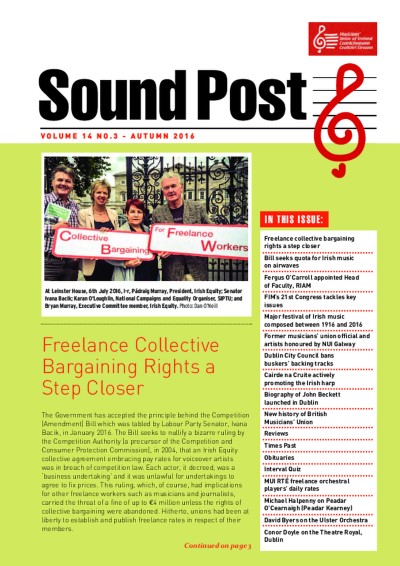Sound Post, Vol. 14, No. 3

| Date: | 2016 |
|---|---|
| Organisation: | Musicians’ Union of Ireland |
| Publication: | Sound Post |
| Issue: | Volume 14, Number 3 Autumn 2016 |
| Type: | Publication Issue |
| View: | View Document |
| Discuss: | Comments on this document |
| Subjects: |
Please note: The Irish Left Archive is provided as a non-commercial historical resource, open to all, and has reproduced this document as an accessible digital reference. Copyright remains with its original authors. If used on other sites, we would appreciate a link back and reference to The Irish Left Archive, in addition to the original creators. For re-publication, commercial, or other uses, please contact the original owners. If documents provided to The Irish Left Archive have been created for or added to other online archives, please inform us so sources can be credited.
Commentary From The Cedar Lounge Revolution
1st March 2021
This is an unusual and welcome addition to the Archive, being the regular publication of the Musicians’ Union of Ireland/Ceardchumann Ceoltóirí Éireann, Sound Post. The MUI/CCÉ is affiliated to SIPTU. As noted in the magazine:
A forum of free expression, Sound Post welcomes material from MUI members. Unless explicitly stated, the views expressed in this newsletter, including goods and services promoted in advertisements, are not necessarily endorsed by the Union. Sound Post is compiled and edited by John Swift, former MUI Secretary, and produced by the Communications Department of SIPTU.
The range of articles in the publication is very varied, and includes news for union members, as with the cover story about ‘Freelance Collective Bargaining Rights A Step Closer’ and another on a Bill seeking a quota for Irish music on airwaves; material on the history of music composed in Ireland and book reviews.
On Collective Bargaining the publication notes:
For well over a decade, the Musicians’ Union of Ireland, Irish Equity, SIPTU and the National Union of Journalists, actively supported by the Irish Congress of Trade Unions, have campaigned vigorously for the full restoration of collective bargaining rights in respect of freelance workers.
As part of its campaign to challenge this blatant injustice, the unions made persistent representations to politicians of all persuasions to take whatever steps were necessary to remedy the situation. Despite specific commitments from Ministers and other TDs to address the freelancers’ grievance, nothing tangible has so far emerged.
Another piece notes:
Under revised bye-laws, which came into force on 1st August 2016, Dublin City Council has banned the use by buskers of backing tracts on the capital’s streets and the use of “lewd, offensive or racist language or conduct”, including in song lyrics. A two-week visiting performers’ permit for €10 now applies, as does a six-week probationary period for performers with a one-year permit.
There are pieces on The Theatre Royal, constructed in 1935 and demolished less than 30 years later in 1962. Another looks at the Ulster Orchestra, then celebrating fifty years, and there is a long piece on Peadar O’Clearnaigh (Peadar Kearney) and the Irish Revolution. Padraig Yeates reviews Saothar 41 and Cliona Doris reviews John S. Beckett: The Man and the Music and there is a piece on a new history of the British Musicians Union.
In sum an engaging and imaginative means of promoting workers rights in a very specific area.
Comments
You can also join the discussion on The Cedar Lounge Revolution
No Comments yet.
Add a Comment
Comments can be formatted in Markdown format . Use the toolbar to apply the correct syntax to your comment. The basic formats are:
**Bold text**
Bold text
_Italic text_
Italic text
[A link](http://www.example.com)
A link